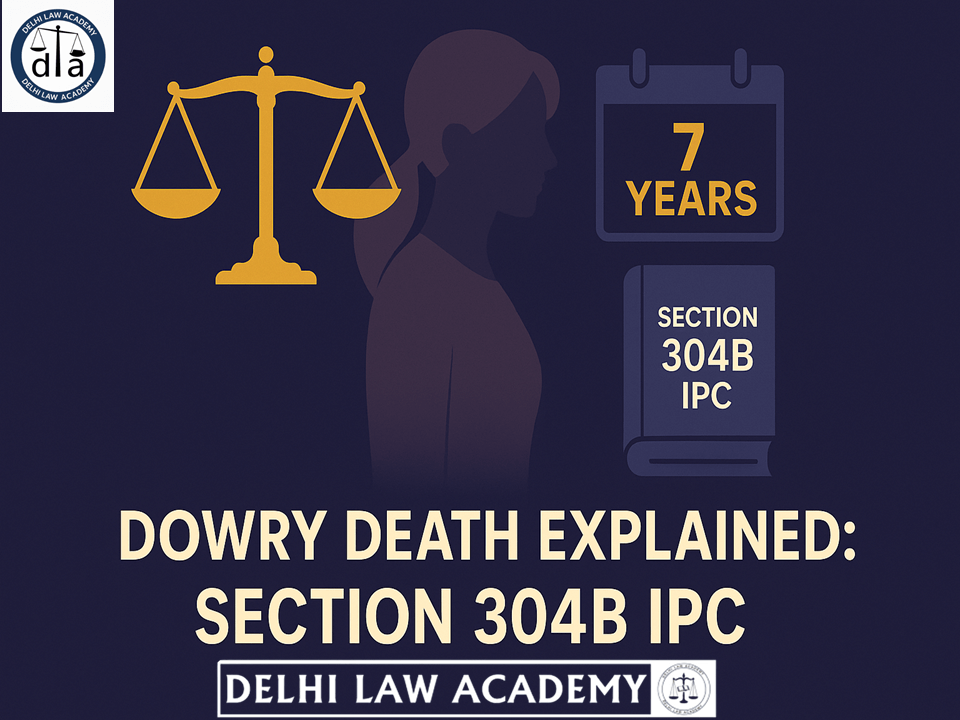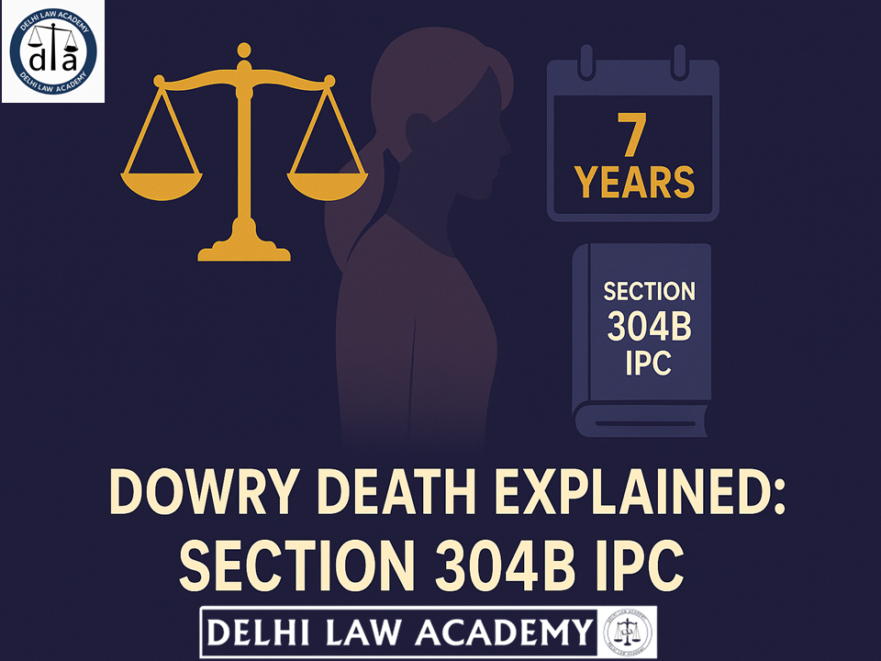
📌 Key Topics in this Blog
- ⚖️ Provisions of section 304B IPC explained
- ❓ Are sections 304B and 498-A mutually exclusive?
- 📌 Is a separate charge necessary?
- 💢 What is the meaning of “cruelty” in Section 304B?
- 🏛️ Supreme Court on scope of section 304B IPC
- 📖 BNS provisions corresponding to section 304B IPC
- 💡 Dowry death provisions explained
- 🔥 Deceased woman hurriedly cremated: legal implications
- 📝 Section 80 BNS corresponds to section 304B IPC
💔 Dowry Death Provisions: Section 304B IPC & BNS Notes
📘 BNS CHAPTER V: OF OFFENCES AGAINST WOMAN AND CHILD
Section 80 BNS: Section 304B IPC – Dowry Death
- Where death of a woman
- is caused by any burns or bodily injury or
- occurs otherwise than under normal circumstances
- within seven years of her marriage
- and it is shown that
- soon before her death
- she was subjected to cruelty or harassment by her husband or any relative of her husband
- for, or in connection with, any demand for dowry
- such death shall be called “dowry death”
- and such husband or relative shall be deemed to have caused her death
📝 Explanatory Notes by DLA on Section 304B
Section 304-B was inserted by the Dowry Prohibition (Amendment) Act, 1986 with a view to combat the increasing menace of dowry deaths.
Are sections 304B and 498-A mutually exclusive?
- Sections 304B and 498-A cannot be held to be mutually exclusive. These provisions deal with two distinct offences. “Cruelty” is a common essential to both the sections and that has to be proved.
- Explanation to Section 498-A gives the meaning of “cruelty”. In Section 304B there is no such explanation about the meaning of “cruelty” but having regard to the common background to these offences we have to take that the meaning of “cruelty or harassment” will be the same as we find in the explanation to Section 498-A under which “cruelty” by itself amounts to an offence and is punishable.
Is a separate charge necessary?
- A person charged and acquitted under Section 304-B can be convicted under Section 498-A without charge being there, if such a case is made out.
- But from the point of view of practice and procedure and to avoid technical defects it is necessary in such cases to frame charges under both sections and if case is established they can be convicted under both the sections but no separate sentence need be awarded under Section 498-A in view of the substantive sentence being awarded for the major offence under Section 304B.
⚖️ Case 1: Shanti v. State of Haryana [1991 SC]
Where the deceased woman was hurriedly cremated
- From the evidence of the father, the brother, and the mother, it is clear that they were not even informed soon about the death and that the appellants hurriedly cremated the dead body.
- If it was natural death, there was no need for the appellants to act in such unnatural manner and cremate the body in great and unholy haste without even informing the parents. Because of this cremation no post-mortem could be conducted and the actual cause of death could not be established clearly.
- There is absolutely no material to indicate even remotely that it was a case of natural death. Thus it was an unnatural death; either homicidal or suicidal.
Can a case of suicide be covered under Section 304B?
Suicide would be a death which had occurred in unnatural circumstances. Even in such a case, Section 304B is attracted.
📄 Summarized version of Shanti v. State of Haryana [1991 SC]
This is a case of dowry death. The deceased was married to one Sat Pal about 9 kilometres away from her home. The marriage took place on 18th April, 1987, Sat Pal, was serving in the army. His father was employed in railways. Smt. Shanti is the mother of Sat Pal. Smt. Krishna, wife of the brother of Sat Pal was another inmate. After marriage the deceased was living in her matrimonial home with accused nos. 1 and 2, the two appellants herein. It is alleged that these two women were harassing the deceased all the while after the marriage for not bringing scooter and television as part of the dowry and she was treated cruelly.
The marriage of one Munni, a cousin of the deceased was fixed for 30th April, 1988. Her brother went to Mundaliya Village twice for bringing the deceased but the accused only taunted him and sent him away without sending the deceased. Ultimately, P.W.1, the father himself went to the home of his daughter, the deceased on 25th April, 1988. The two appellants misbehaved with him saying that if he was fond of his daughter he ought to have arranged scooter and television as part of the dowry and he was insulted and pushed out of the house.
On 26th April, 1988, at about 11 p.m., P.W.1 came to know that the deceased had been murdered and was cremated by the two ladies with the help of another three persons.
This Section (304-B) was inserted by the Dowry Prohibition (Amendment) Act, 1986 with a view to combat the increasing menace of dowry deaths.
Both the Courts below have held that the two appellants did not send the deceased to her parents’ house and drove out the brother as well as the father of the deceased complaining that scooter and television have not been given as dowry. we are satisfied that the prosecution has established beyond all reasonable doubt that the appellants treated the deceased cruelly and the same squarely comes within the meaning of “cruelty” which is an essential under Section 304-B and that such cruelty was for demand for dowry. It is an admitted fact that death occurred within seven years of the marriage.
Now we shall see whether the other essential, whether the death occurred otherwise than under normal circumstances is also established? From the evidence of PW1-the father, PW2-the brother, and PW3-the mother, it is clear that they were not even informed soon about the death and that the appellants hurriedly cremated the dead body. The accused examined defence witnesses to rebut the presumption and to show that the deceased suffered heart-attack. We have examined the evidence of DWs2 and 3 and we agree with the Courts below that this theory of natural death cannot be accepted at all. No material was placed to show that the deceased suffered any such attack previously. If it was natural death, there was no need for the appellants to act in such unnatural manner and cremate the body in great and unholy haste without even informing the parents. Because of this cremation no post-mortem could be conducted and the actual cause of death could not be established clearly.
There is absolutely no material to indicate even remotely that it was a case of natural death. It is nobody’s case that it was accidental death. Thus it was an unnatural death; either homicidal or suicidal. Assuming that it is a case of suicide even then it would be death which had occurred in unnatural circumstances. Even in such a case, Section 304B is attracted.
Sections 304B and 498-A cannot be held to be mutually exclusive. These provisions deal with the two distinct offences. It is true that “cruelty” is a common essential to both the sections and that has to be proved. The Explanation to Section 498-A gives the meaning of “cruelty”. In Section 304B there is no such explanation about the meaning of “cruelty” but having regard to the common background to these offences we have to take that the meaning of “cruelty or harassment” will be the same as we find in the explanation to Section 498-A under which “cruelty” by itself amounts to an offence and is punishable. Under Section 304B, it is the “dowry death” that is punishable and such death should have occurred within seven years of the marriage.
No such period is mentioned in Section 498-A and the husband or his relative would be liable for subjecting the woman to “cruelty” any time after the marriage. Further, a person charged and acquitted under Section 304-B can be convicted under Section 498-A without charge being there, if such a case is made out. But from the point of view of practice and procedure and to avoid technical defects it is necessary in such cases to frame charges under both the sections and if the case is established they can be convicted under both the sections but no separate sentence need be awarded under Section 498-A in view of the substantive sentence being awarded for the major offence under Section 304B.
📘 Stay Ahead with Delhi Law Academy!
Get access to free monthly current affairs, read our insightful blogs,
and explore free study resources prepared by experts at DLA Jaipur. 🚀
💡 Frequently Asked Questions on Dowry Death (Section 304B IPC)
• Where death of a woman
o is caused by any burns or bodily injury or
o occurs otherwise than under normal circumstances
• within seven years of her marriage
• and it is shown that
o soon before her death
o she was subjected to cruelty or harassment by her husband or any relative of her husband
o for, or in connection with, any demand for dowry
• such death shall be called “dowry death” and such husband or relative shall be deemed to have caused her death.
• Sections 304B and 498-A are not mutually exclusive.
• “Cruelty” is a common essential to both sections and must be proved.
• Section 498-A gives meaning of “cruelty,” while Section 304B does not, but the same meaning applies in the context of dowry death.
• A person charged and acquitted under Section 304B can be convicted under Section 498-A without a separate charge if the case is made out.
• From a procedural standpoint, it is preferable to frame charges under both sections, but no separate sentence is required under 498-A if 304B conviction is awarded.
• Yes. Even if the death occurs due to suicide under unnatural circumstances, Section 304B is attracted as it deals with dowry-related cruelty and harassment within seven years of marriage.
• “Cruelty” refers to harassment or acts causing mental or physical suffering of the woman by her husband or relatives in connection with dowry demands.
• Such cruelty is an essential element for establishing dowry death under Section 304B.
• If the deceased is cremated without informing the family and no post-mortem is conducted, the death is considered unnatural.
• Section 304B still applies even if the death is suspiciously expedited, as established in Shanti v. State of Haryana [1991 SC].
Contact us
📍 Delhi Law Academy – Jaipur Branch
6C, Tower 2, Coaching Hub, Pratap Nagar, Jaipur – 302033
📞 Phone:
+91 9911916552
+91 8447285606
✉️ Email:
contactus@delhilawacademy.com

